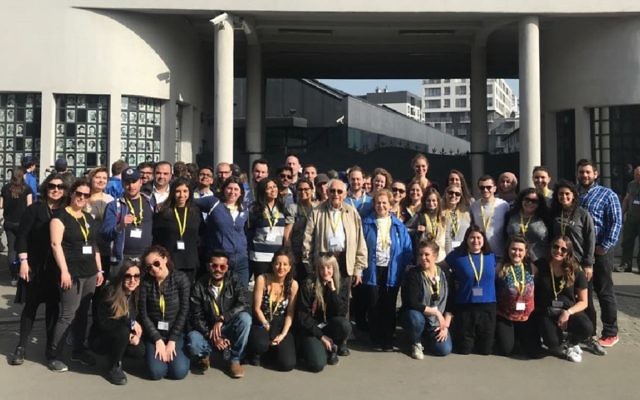March of the Living – The delegation
Jewish News’ Andrew Sherwood spoke to some of the record-breaking 275 participants from the UK to find out why they wanted to go on the trip and what they took out from it
Andrew Sherwood is the Jewish News Sport and Community Editor
Joining Bus F for this year’s March of the Living trip, Jewish News’ Andrew Sherwood spoke to some of those he shared a bus with to find out why they went on the trip and – more importantly – what they took from it.
Forming the Young Professionals, the group featured a mixture of Brits and non-Brits, Jews and non-Jews, all of whom had a variety of reasons for being in Poland, though all shared the same common outlook of it being a truly challenging and in some cases, life-changing experience.
MARCH OF THE LIVING – THE EDUCATORS:
MARCH OF THE LIVING – THE BUS LEADERS:
WATCH CHELSEA FC DELEGATION AT MARCH OF THE LIVING:
CLICK HERE FOR FULL COVERAGE OF THIS YEAR’S MARCH OF THE LIVING:
Jonathan Peters, 24, London
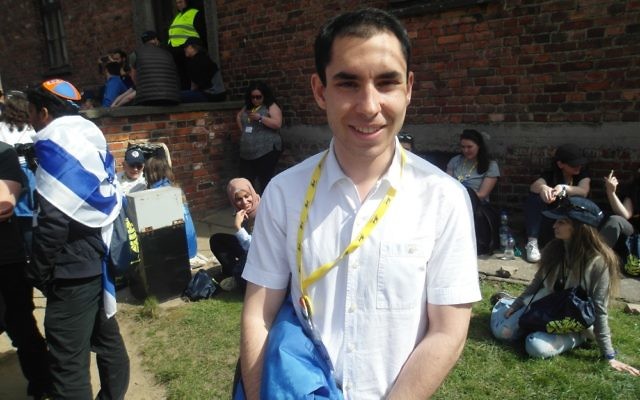
I’ve wanted to go on the trip for many years. I thought it was essential to go now because, I wanted to hear first-hand from the survivors, while they are still with us.
I’ve seen things that I will never forget, it’s been an intense, relentless, harrowing experience, but I think it’s important to come, to bear witness, and to preserve the memory of what happened here. I will go home and tell as many people as I can as to what I’ve seen.
Dorith Benjamin, 24, Mumbai (pictured right)
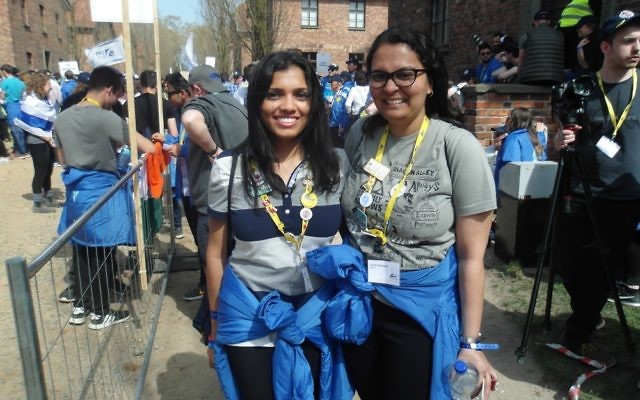
I had been to Yad Vashem when I was 18, which is when I found out about this trip. We don’t have any Holocaust Survivors in India, so the only information we get about the Holocaust is very limited.
My sister came on this trip last year with the UK Delegation, and then I decided I wanted to go on this one. With the youngest survivor being 88, this may be one of the last chances we get to experience it with them. This trip has been very different for me and I’m looking forward to going home to telling everyone about it, and to try and get more people to come.
Dr Siddhi Patil, 27, Mumbai (pictured above left)
I’ve had a great interest in the Holocaust, read books about it, such as Anne Frank and yet even though I’m Jewish, I’ve had no exposure to any kind of Holocaust Survivors. Our forefathers never faced any type of anti-Semitism so this was something new to me,
I wanted to experience this, not only as a Jew, but as a human being – I wanted to know how I could connect to it and I felt really connected coming on this trip.
Ricky Shamash 34, Golders Green
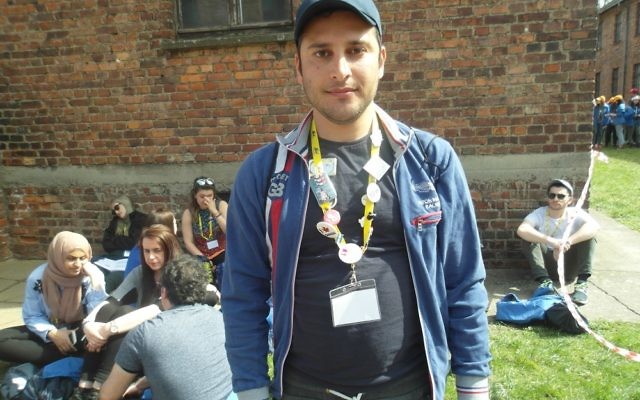
I always knew I’d come on this trip and felt now I was ready to do so to finally see it. Every Jew – in fact everyone – should see this.
My overriding thoughts would be anger – I was surprised by that as I was very angry, it was very tense but I thought it was an amazing trip and one that everyone should do, at least once in their lifetime.
Alex Fenton 32, London
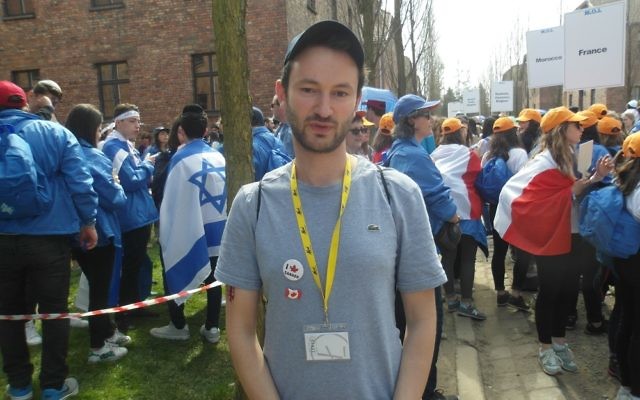
I avoided coming on the trip for a couple years because I wasn’t sure about the March and how I would feel. But the reason why I came this year was to get a deeper understanding of my family’s history – particularly my mum’s side, my grandfather lost three siblings in the Holocaust – to understand it, emotionally, not just intellectually – not to just understand the facts.
I found the whole trip more difficult that I thought I would. There’s something about coming to these places with family members who I’d obviously never met in mind. The previous time I’d been here was almost like an historical visit, but this time I have felt, for example seeing the town where my grandad was born in Belzec, a really emotional, powerful experience – it’s hard to describe. It’s a feeling of being connected, but also distant. The most powerful bit, having done some research beforehand – which I’d recommend to anyone coming on the trip – meant that when I went through the gas chamber at Majdanek, I had a picture of someone in mind and it brings to home the horror that someone felt and added to a deeply moving trip that will change me in as way I probably haven’t worked out yet.
Zaynab Albadry 23, Iraqi-born, now living in London
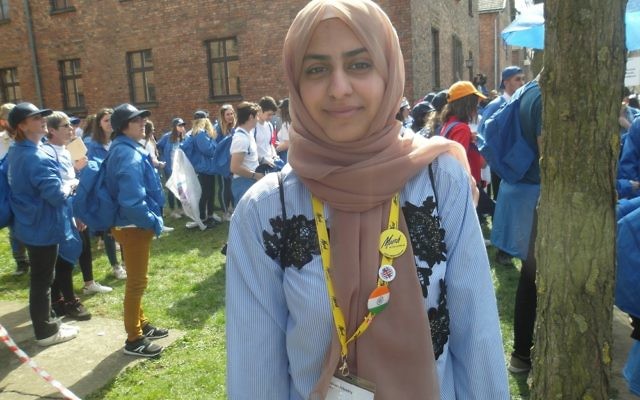
I wasn’t aware of MOTL until my colleague mentioned it. I’m not Jewish myself, but as part of the project I work for, Stand Up! Education Against Discrimination, I go into schools to talk about anti-Semitism, Islamophobia, racism and discrimination. I thought it would be useful to come here for some sort of training, I obviously know more about Islamophobia, but felt like going on this trip would be educational and insightful and would allow me to see things first hand, as opposed to reading it through textbooks as it gives much more meaning. I’m glad that I came and was very privileged that my workplace sent me here.
I think what I appreciate in terms of how MOTL organise this is firstly they focus on Jewish life before the Holocaust – giving you an insight as to how it was – and the contribution Jewish people made to Poland, and I think that’s very important to understand because we only know what we lost when we know what we had. It’s been great educationally, I’ve learnt a lot in depth information from our brilliant educators and personally, when it comes to my emotions, at times I was frightened walking into the Concentration Camps. While we were walking, I wanted to get there to see everything but at the same time, I felt if I walk and ended up in a Concentration Camp, I would lose hope in humanity. As I was walking up in, I was thinking what were people doing at the time? Why weren’t they intervening? Why did it take countries so long to realise what was happening? Or, did they know and just turn a blind eye to it? We should never face racism or discrimination in silence, we should always face it and confront it otherwise it will escalate.
Natalia Nichitina 26, Moldovan-born, now living in London
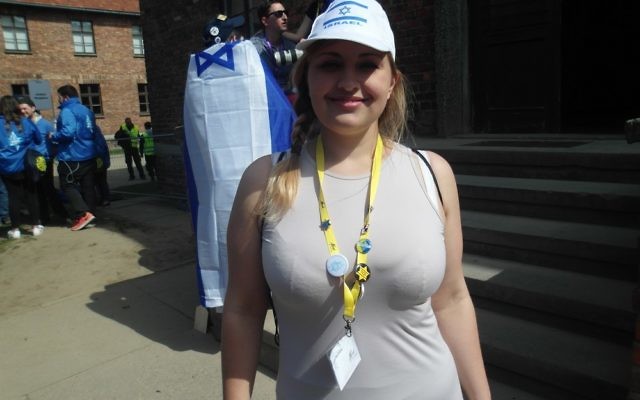
A friend of mine, another educator, has been telling me about this trip for a number of years and was something I’ve been interested in due to my family history, my great grandparents took part in WW2, one of my great granddads escaped from a camp in Moldova, while fighting for the Russian army, but I have been postponing this trip. This was my last year at university and I felt if something was to change in my life, I may not have another opportunity.
From the very first day, I think having looked at it from the perspective of some of my family going through this, living through it, I came to the realisation that I am definitely not doing enough with my life, if people under such circumstances could do so much and make such hard decisions and fight so hard, today we are way too comfortable in our lives, are definitely not making enough effort and not standing up for things we should be. My first – and most important – decision I make from this trip would be to try and make as much out of my life as I can and try to make better changes for this world.
Gaby Kenton, 21, London (pictured left)
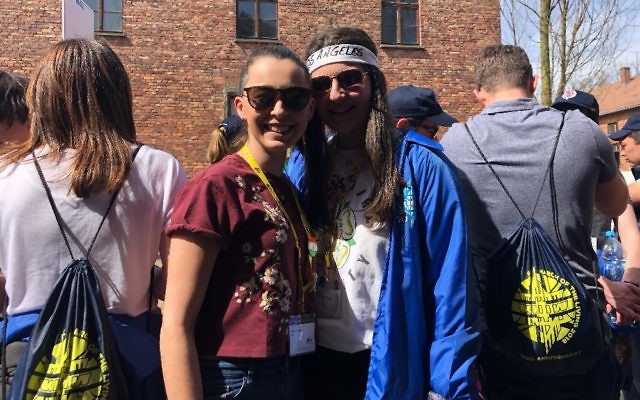
I’d previously been to Poland back in 2012 with school, and after hearing about a friends’ experience I felt that this trip was something that I needed to experience. I wanted to experience Poland with a fresh perspective and meet other young Jewish adults along the way, this was a chance that I simply didn’t want to pass up.
Spending all week alongside our survivor Harry, hearing his story and saying Kaddish alongside him for his mother and his sister are experiences I will never forget. Seeing his love for life, and being unable to remove a smile from his face, in addition to the other survivors I was fortunate enough to meet has ignited a real passion for making the most of what we have.
In 2018, the Jewish population is very much still alive and has the brightest future, I’m not religious and not observant but I genuinely could not be more proud of my faith.
Miri Gellert, 29, London (pictured bottom left)
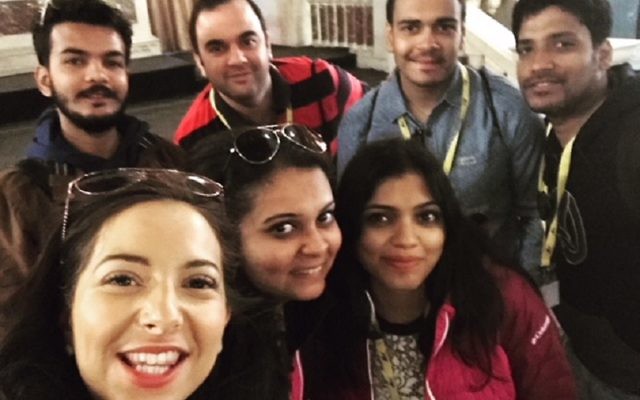
The Shoah has always been at the forefront of my family history. I have been fortunate enough to have relatives who share the many colourful stories – both tragic and inspiring – of my relatives from former Czechoslovakia.
We lost around 70 members of our family in the camps, but there were also a significant number who survived – enabling me to be here recalling this experience. My great-uncle Jozef, great-aunt Katica and dad’s cousin Erzsi (the latter of whom is still alive at 95 in Sydney, Australia), all survived Auschwitz.
While I visited Auschwitz-Birkenau as a teenager with my family, I felt the need to return as an adult and as an individual. I was very much representing my family, but this time experiencing everything through my own eyes with a significantly more direct connection to the relatives who suffered.
The first time I really felt the pain and grief directly was as I walked through the gas chamber at Majdanek. This was all the more heart-wrenching for me since I was armed with the new information that some of the family (previously thought to have to died at Auschwitz) were in fact deported here (confirmed for me two days later by the Book of Names at Auschwitz).
In addition to expecting an educational, spiritual and emotional journey, I came on this trip with a strong desire to find a message of hope and light amongst the memories of darkness and despair.
The final night saw six people from the Mumbai Jewish community teach and lead us in a joyous Bollywood dance, after an incredibly emotional, painful and yet uplifting journey, what better lasting expression of hope and revived identity than this?
We. Are. Here.
Debra Silver, 34, London
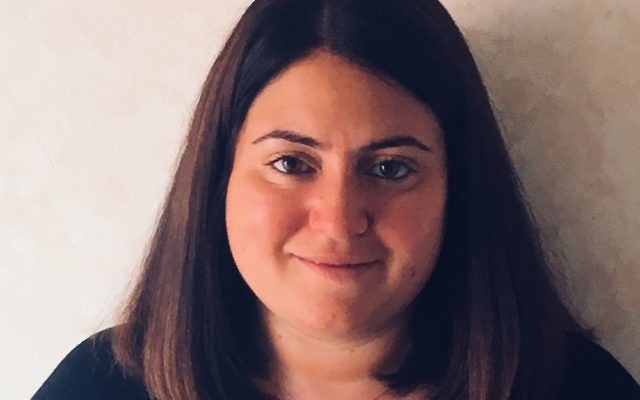
I previously visited krakow and Auschwitz 10 years ago and was unsure about coming on a second visit. However, my experience with MOTL was quite different, travelling more extensively through Poland, the reality of how huge the holocaust was and how much I still had to learn hit me quite hard.
I also believe that a trip with Harry Olmer, a survivor who shared his experiences with us, brought the situation more emotion and was extremely powerful.
MOTL, unlike my last trip has left me wanting to return, to learn more, to see more and to help others to have the same experience I did.
Stacey Abendstern – representing Maccabi GB – 25, Leeds-born, lives in London
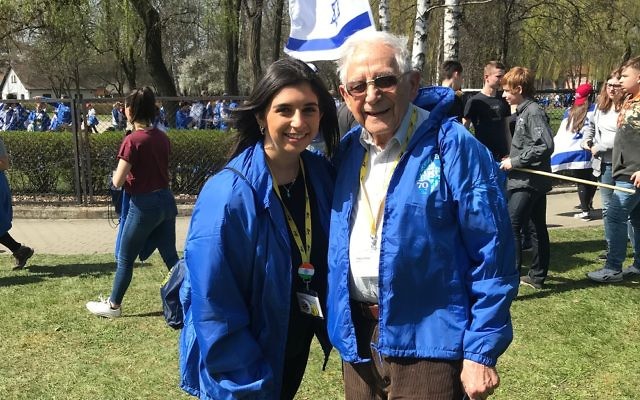
I’ve wanted to go back to Poland on MOTL for a few years now. I went on a Leeds Youth trip when I was 14, 11 years ago, but I am now in a very different stage of life and therefore felt it was necessary to go back.
However, a few days before the trip, I decided to speak to my Opa (Grandad). I have always known that he left Germany (his home country) before the Holocaust, but nothing more than that. I never asked him because I thought it may upset him and he didn’t speak about it either so I presumed there was nothing else to know. However, when we had a long conversation on the phone the day before MOTL, he told me that his Grandma and Uncle (my Great Great Grandma and Uncle) were perished in Auschwitz during the Holocaust. I had no idea about this and neither did my dad or anyone else in my family. This completely changed my whole experience and perspective for the trip as I now felt this journey would allow me to explore my family’s history and learn again about the horrors and tragedies that my family also went through.
It was an intense week but an extremely meaningful one. I went through a mix of emotions, I questioned everything and discussions stimulated even more questions with the majority of them being unanswerable. One thing is certain though, I have come home feeling more proud than ever to be Jewish.
I am still processing the trip (and think I will be for a long time) but I urge everyone to explore their own family history rather than presume, speak to your older relatives whilst you still have the chance too and pass on what you’ve learnt and your experiences to ensure that absolutely no one will ever forget.
Lori Greenglass, 31, London, (centre)
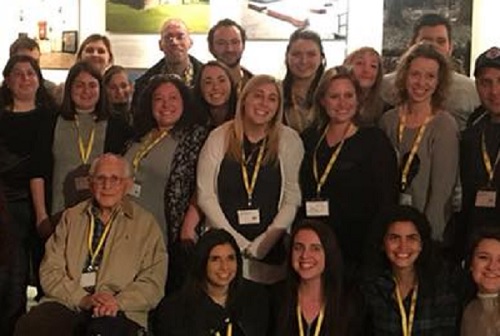
I decided to go on the trip to learn more about this period in our history, visit sites and to meet and hear from the survivors.
You can’t prepare yourself for the emotions you feel when you are walking through the gas chambers or crematorium of Majdanek, or the realisation that the city of Lublin was and still is overlooking such a place. You can’t prepare yourself for the horrors of Belzec, when you are told that it was destroyed in 1943 because they were ‘finished,’ or the tears that are shed when Harry Olmer recited Kaddish on behalf of his family who were murdered there.
You can’t prepare yourself for the stories our survivors told; the memories, the nightmares, the pain… Yet despite it all, the uplifting feeling of them still being here, sharing their stories and their messages of hope and tolerance for future generations.
Although nothing will prepare you for any of these things, what March of the Living does do is educate you, support you and give you a voice (if you wish to share it) to process the whirlwind of emotions that you feel across the six days. Our group arrived in Poland as strangers and six days later, arrived back in London, Scotland, Israel, Berlin and Mumbai forever connected by our shared experiences and emotions that we will never forget but will share and use to educate others.
Esther van Vliet, 27, Cambridge
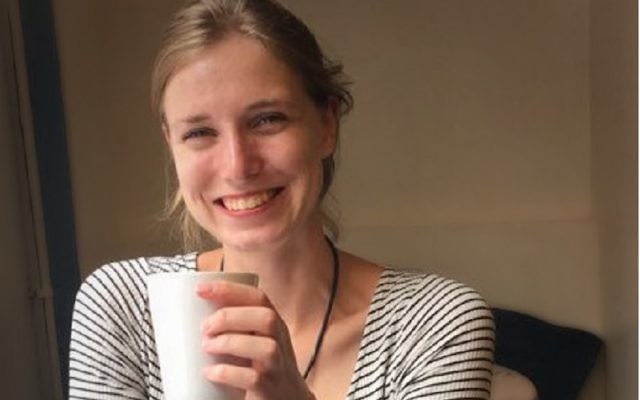
When I just started my job I had to request annual leave for the March of the Living. Some of my new colleagues wondered why I was spending my annual leave on a “Holocaust trip” and they might have doubted my choice for a holiday, as it didn’t sound too relaxing.
There were a few reasons why I wanted to go. I had never visited Poland before and having a Jewish background, I felt this might be a good learning experience. But what convinced me to register for this trip was the possibility to go through this journey with a survivor. The survivors I have met at events before have always been incredibly inspiring and it felt like a “now or never” moment if I wanted to learn and grow from their experience.
It has been an incredible journey! Despite having lost (distant) relatives to the Holocaust, I never really felt the connection and I am grateful that this trip has helped me to embrace and become curious about that side of me. This connection was mostly triggered when we visited some mass graves in a forest. Being there released an inner anger that I was surprised to feel. Anger isn’t an emotion I am really familiar with, so why did this fell upon me? My relatives passed away in Belarus, where whole towns were slaughtered. The anger derived from a feeling of injustice and the concern that, being murdered in a rural area, there are probably no memorials in place to commemorate my relatives. Now that I’m back in England I plan to read into this horrid aspect of the holocaust to understand better what happened, which is something I wasn’t interested in (or maybe didn’t dare to) before this journey.
Another take away message derived from listening to and talking with survivors of the holocaust. One of the messages that came across was that living a good life is the biggest act of resistance towards the “final solution” of the Nazis. This made me realise: how can I get most out of my life to ensure that whatever the size of obstacles I came/ come across I can face and overcome them? What is really important to me and how to live life fully? I am incredibly thankful for this insight and look forward to searching for my answers in the time to come.
Spending my annual leave to wake up each morning at 6am and be overblown by information on Jewish history has been one of the best ways to spend my leave. I would recommend everyone to join the March in an upcoming edition, but in the meantime I would even more encourage you to ask your family about their stories of the Second World War. You might be surprised and able to start understanding an additional story connected to your life.

Thank you for helping to make Jewish News the leading source of news and opinion for the UK Jewish community. Today we're asking for your invaluable help to continue putting our community first in everything we do.
For as little as £5 a month you can help sustain the vital work we do in celebrating and standing up for Jewish life in Britain.
Jewish News holds our community together and keeps us connected. Like a synagogue, it’s where people turn to feel part of something bigger. It also proudly shows the rest of Britain the vibrancy and rich culture of modern Jewish life.
You can make a quick and easy one-off or monthly contribution of £5, £10, £20 or any other sum you’re comfortable with.
100% of your donation will help us continue celebrating our community, in all its dynamic diversity...
Engaging
Being a community platform means so much more than producing a newspaper and website. One of our proudest roles is media partnering with our invaluable charities to amplify the outstanding work they do to help us all.
Celebrating
There’s no shortage of oys in the world but Jewish News takes every opportunity to celebrate the joys too, through projects like Night of Heroes, 40 Under 40 and other compelling countdowns that make the community kvell with pride.
Pioneering
In the first collaboration between media outlets from different faiths, Jewish News worked with British Muslim TV and Church Times to produce a list of young activists leading the way on interfaith understanding.
Campaigning
Royal Mail issued a stamp honouring Holocaust hero Sir Nicholas Winton after a Jewish News campaign attracted more than 100,000 backers. Jewish Newsalso produces special editions of the paper highlighting pressing issues including mental health and Holocaust remembrance.
Easy access
In an age when news is readily accessible, Jewish News provides high-quality content free online and offline, removing any financial barriers to connecting people.
Voice of our community to wider society
The Jewish News team regularly appears on TV, radio and on the pages of the national press to comment on stories about the Jewish community. Easy access to the paper on the streets of London also means Jewish News provides an invaluable window into the community for the country at large.
We hope you agree all this is worth preserving.


